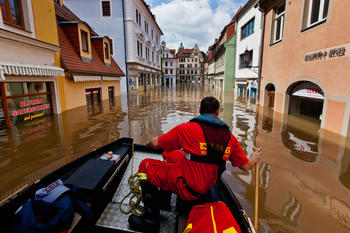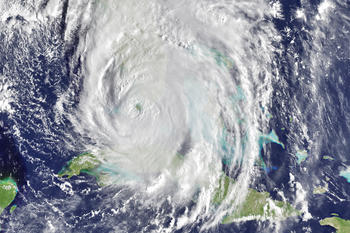Ready for an Emergency?
Scholars and scientists from the Disaster Research Unit at Freie Universität Berlin study the social causes of disasters and human behavior in crisis situations – and have been doing so for more than 30 years now.
Dec 18, 2017
Traumatic experience: During flooding on the Elbe River in 2013, the historic city center of Meissen, Germany, was under more than a meter of water.
Image Credit: Jürgen Lösel/dpa-Zentralbild
A dangerous spiral. Hurricane Irma raged through the Caribbean in September. This satellite photo shows the hurricane on a path toward Florida.
Image Credit: NASA
Satellite images only provide a rough impression of the hurricane’s scale: They show a white spiral, incessantly spinning around and inexorably approaching the Caribbean islands unlucky enough to lie in its path – Barbuda, Haiti, and Cuba, for example – before making landfall on the American mainland in Florida.
Hurricane Irma raged for 37 hours in mid-September, reaching wind speeds of 295 kilometers per hour as it battered the islands and coastal regions. The storm broke records.
It was the strongest Atlantic hurricane ever to form outside the Gulf of Mexico and the Caribbean since the National Hurricane Center, in Miami, Florida, started keeping records. It left a trail of devastation in its wake: destroyed houses, roofs ripped off buildings, flooded streets. Dozens were injured, and at least 70 people died. Many households went without electricity and water for days. For victims and their family members, it was a sheer disaster.
Extreme weather events dominate the news time and again. In Germany, as elsewhere, heavy rainfall this past summer flooded roads and basements. Flooding along the Elbe River in 2013 and 2002 caused especially severe damage and kept people in the affected regions on tenterhooks for weeks.
“To sociologists, an event becomes a disaster when it fundamentally shakes people internally,” explains Martin Voss. A professor of sociology, Voss is in charge of the Disaster Research Unit at the Department of Political and Social Sciences at Freie Universität Berlin. He and his team have studied the aftereffects of the Elbe flooding on those affected. “We discovered that the people there continue to suffer greatly,” he says. “They’re really traumatized. And not just because they suffered material losses, but also because these people were pushed into a social situation that is difficult for them.”
In one current research project, the scholars and scientists are comparing the handling of the flooding and its effects in this country with a similar situation in Mumbai, India. In another project, researchers are working with Germany’s national weather service, the Deutscher Wetterdienst (DWD), and with the Institute of Meteorology at Freie Universität Berlin and other research partners to develop an improved warning system for extreme weather events that can be used to inform the populace, aid organizations, and other institutions of impending threats and specific actions that can be taken, early on and on a more targeted basis.
There are also plans for new international cooperative initiatives to study things like “how living conditions in a region hit by a crisis can be stabilized and improved in such a way that people there can live with dignity and are not forced to leave their homes,” Voss says.
The social scientists work with many different institutions both within Germany and internationally for their research, from private companies to government agencies and from civic initiatives to aid organizations. “Our work spans the whole spectrum,” Voss explains. “We develop theories in the social sciences and engage in fundamental research, but we also work on specific questions posed by our partners based on real-world practice, such as how aid organizations can successfully implement a larger evacuation and provide optimum care to the people involved, with all their many different needs.”
The research unit has already analyzed many disasters and crises from a scholarly standpoint. The institute was founded by Lars Clausen, a sociologist from the city of Kiel, who paved the way for its work. Clausen was appointed to the Schutzkommission (Commission for Protection) of the German Federal Ministry of the Interior in 1972. “Clausen was tasked with finding out how humans influenced the emergence and progress of disasters and coping with disasters and how the populace could be prepared for an emergency – a nuclear war, that is,” Voss says. “People wanted to know how people would act and what needed to be done to cope with the situation.”
That might sound a bit cynical today, but 45 years ago, it was a real-world scenario. “Based on this assignment, Clausen developed a theoretical question: What can cause a society to completely stop functioning? That was the start of disaster theory in sociology.”
Further research assignments followed, including one to study the snowfall disaster that brought northern Germany to a standstill in the winter of 1978/79. Finally, in 1987, Clausen founded the Disaster Research Unit at Christian-Albrechts-Universität zu Kiel, together with his assistant and later head of the unit, Wolf Dombrowsky.
It was a time when serious crises were everywhere. “1986 was a milestone year in disaster research, with the Challenger disaster and, of course, Chernobyl,” Voss says. “The environmental movement was a big subject, and so was the threat of nuclear war. On top of that, there were famines in Africa. Overall, there was a lot happening.”
Voss himself wrote his dissertation under Clausen, and he joined the Disaster Research Unit as a researcher in 2008. He has been the head of the unit since 2011. Three years later, the unit moved to Freie Universität Berlin, where it will celebrate its 30th anniversary this year.
Public perceptions of disasters have changed over time, Voss says. “Thanks to globalization and the reports that appear in the media and on social networks, we watch a disaster like Hurricane Irma unfold almost in real time, even though we are thousands of kilometers away and in safety.” Voss explains that this affects public policy and global affairs, but also how individuals feel. “What unsettles us the most, deep down, is no longer just that people have lost the roof over their heads,” he says. “It’s the feeling that the future no longer seems as secure.”
The unit’s work focuses on fighting the root causes of crises and disasters and of human suffering, but also on how people behave in the face of lasting uncertainty. What strategies might help them? That is exactly what Voss and his 25 associates at the Disaster Research Unit aim to find out through their work. “Our goal is to show what kinds of social processes put people in positions of need, while also giving people tools to cope better with a crisis situation so that it loses some of the fear attached to it and people have an easier time returning to normal life.”
Awareness of potential crises plays a key role here. We simply have to accept the fact that disasters will continue to occur, Voss says. “We actually already have a very good grasp of all the things that have to do with nature,” he explains, adding that in his opinion, the harder part is facing the unknown.
“We don’t know exactly what kinds of disasters will befall us in the future, of course. But we do need to devote more thought to them so that we can also be prepared for unlikely occurrences, the proverbial ‘black swan’ – events so rare that they might occur only once every 500 or 1,000 years. There are a whole host of events like these, such as a major pandemic or a global financial market crash.” The Fukushima disaster suggests that in the future, we will increasingly face events that are clearly attributable to social or political decisions
It is also impossible to predict how human interactions will develop in a crisis. “We cannot assume people will act as we are accustomed to them doing in these situations,” Voss explains. “At the same time, though, past events have shown that people come together and support each other in crises and disasters.”
It is possible to take action here, too. Voss says the populace should do more than just making material preparations for emergencies, for example, by stocking up on food and drinks. “Our social contacts are at least as important. In an emergency, it’s always better to be part of a community with a sense of solidarity.” This was also apparent during Hurricane Irma. If not for neighbors helping neighbors, the number of victims would probably have been much higher.
Further Information
Professor Martin Voss, Disaster Research Unit (DRU), Department of Political and Social Sciences, Freie Universität Berlin, Email: martin.voss@fu-berlin.de


